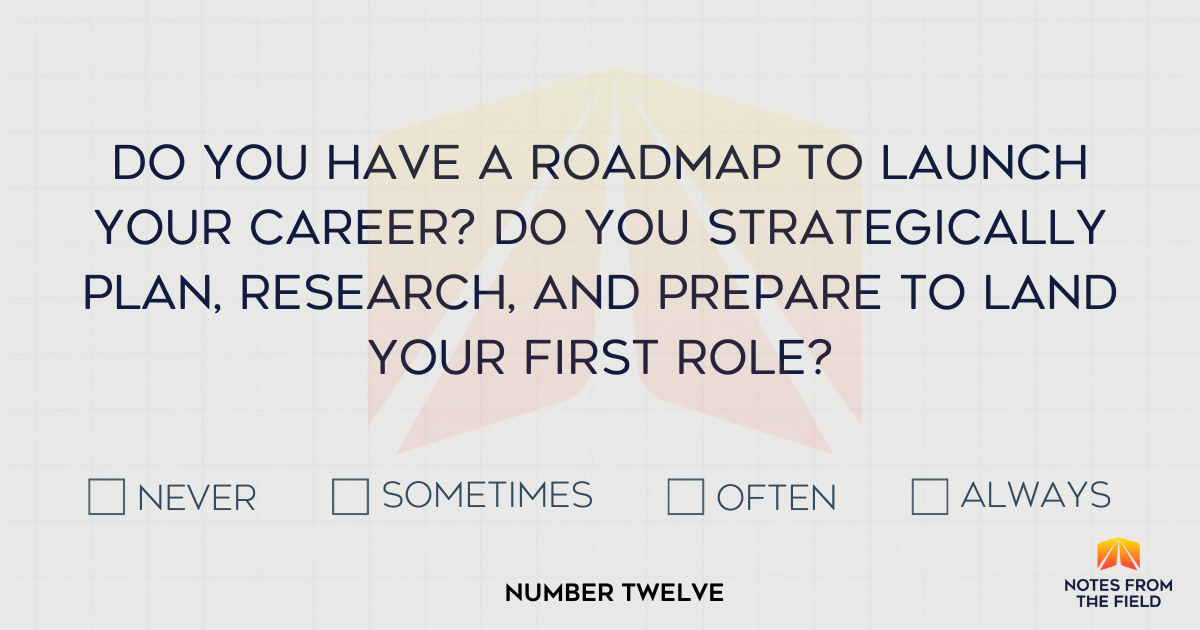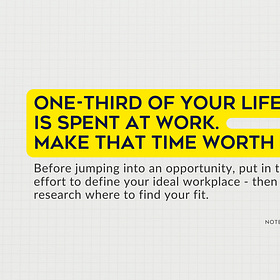Launching Your Career: An Introduction
You’re not just stepping into a job; you’re launching your career.
Welcome to the first step in your career: landing your first role. This journey is exhilarating and, let's be honest, a bit daunting. Fear not; you’re not the first to embark upon this journey, and this series will guide you through your transition to the working world with practical advice, real-world wisdom, and encouragement. Together, we'll navigate the complexities of the job market, arming you with the tools, knowledge, and confidence you need to carve your place in the professional world.
The path from school to a career is rarely a straight line. It's filled with twists, turns, and the occasional speed bump. However, the key to a successful career launch is in your preparation, adaptability, and tenacity. These topics aim to equip you with a compass to navigate this journey: a series of ten key topics and associated workbooks, each designed to tackle the critical components of your career launch.
Launching Your Career: A Roadmap to Success
Here’s a sneak peak of our topics across the next ten weeks:
Researching the Sector, Industry, and Companies
Knowledge is power. Begin your journey by delving into the sectors, industries, and companies that spark your interest. Understand the landscape and identify where you could shine.
Building Your Network
The digital age offers unparalleled opportunities to connect and engage. Learn how to follow, engage, and contribute to social media channels relevant to your career aspirations. Your digital footprint can open (and close) doors.
Discovering Opportunities
Unearthing roles and opportunities that resonate with you is an art. Utilize our guide to work through the processes of finding job postings that not only match your skills, but also your passions.
Preparing to Apply for Roles
Once a job catches your eye, it's time to dig deeper. Understand the company culture, the role's nuances, and how you can make a meaningful impact.
Acing the Interview
The interview process is your moment to shine. From preparation to follow-up, discover strategies to convey confidence, competence, and good fit.
Getting the Offer
Receiving a job offer is a pivotal moment. We'll explore how to navigate the offer stage, from negotiation to acceptance, with grace and professionalism.
Handling Rejection
Not every application leads to an offer, but every experience is a learning opportunity. This chapter focuses on resilience, learning from rejection, and maintaining momentum.
Ready, Set, Launch!
Your first through thirtieth days on the job are crucial. Set yourself up for success with strategies to make a positive impact from the start.
Launching Your Career: Dig Your Well Before You’re Thirsty
Diving into your career isn’t a spontaneous action. It's a journey that ideally begins long before you hit the "apply" button. This proactive approach not only positions you more favorably in the eyes of employers, but also enhances your clarity in what you truly seek from your professional life. Here’s why and how you should start preparing for employment opportunities well before discovering a specific job posting:
Understanding Your Own Aspirations and Strengths
Self-Reflection is Key: Before even looking at job postings, it's crucial to understand what you want from your career. What industries interest you? What skills do you have and enjoy using? What kind of work environment do you thrive in? This understanding shapes your career direction and helps you identify opportunities that align with your aspirations and strengths.
Skill Development: Identifying the skills required in your field of interest allows you to acquire or sharpen these skills ahead of time. This can involve formal education, online courses, volunteering, or side projects. The goal is to build a robust skill set that makes you a strong candidate when the right opportunity arises.
Want additional insights on self-awareness? Check out our resources on these topics.
Building a Professional Network
Networking: Establishing a professional network is invaluable. Networking isn’t about asking for jobs; it’s about building relationships, gaining insights into your industry, and getting advice from experienced professionals. Most often, jobs are filled through referrals before they even get posted publicly. Being well-connected means you might learn about these opportunities early on.
Mentorship: A mentor in your desired field can provide you with guidance, feedback, and support. Mentors can also introduce you to their professional networks, potentially leading to opportunities that align with your career goals.
Creating a Personal Brand
Online Presence: In today’s digital world, your online presence is about as important as your resume. Creating a professional LinkedIn profile, a personal website, or a portfolio showcases your skills, projects, and professional persona. This presence can attract recruiters and demonstrate your interest and commitment to your field.
Contributing to Your Field: Whether through blogging, participating in forums, or contributing to open-source projects, being active in your field can set you apart. These contributions display your passion, knowledge, and initiative, making you an attractive candidate to potential employers.
Staying Informed and Adaptable
Industry Trends: Keeping ahead of industry trends and changes is crucial. This knowledge not only informs your job search strategy, but also prepares you for interviews and discussions with professionals in your field. It shows you're engaged and proactive about your career.
Flexibility: The job market is ever-changing, with new roles emerging as technologies and industries evolve. By preparing early, you’re more likely to be adaptable, open to new opportunities, and able to pivot when necessary.
Launching Your Career: Notes on the Employment Landscape
In 2024, several key factors give us insight into what recent graduates can expect as they enter the workforce. Here’s an overview of the workplace environment trends for college graduates in 2024:
Increased Emphasis on Digital Competencies
As digital transformation accelerates across industries, college graduates with strong digital skills will be in high demand. This includes proficiency in digital marketing, data analytics, AI implementation strategies, and an understanding of digital business models. Graduates who demonstrate expertise in leveraging technology to solve business problems will have a competitive edge.
Focus on Sustainability and Social Responsibility
There's a growing expectation for businesses to contribute positively to society and the environment. Knowledge and skills in sustainability practices, Corporate Social Responsibility (CSR), and ethical leadership are becoming increasingly valuable. Companies are looking for graduates who can integrate these principles into business strategies to drive long-term growth and compliance with global standards.
High Need for Flexibility and Adaptability
The COVID-19 pandemic highlighted the importance of adaptability and flexibility in the business world. Graduates who are comfortable with change, can manage uncertainty, and can work effectively in a variety of settings (including remote and hybrid models) will be well-positioned for success.
Top Skill for 2024 (and Beyond): An Entrepreneurial Mindset
Within larger and smaller organizations alike, an entrepreneurial mindset is coveted. This includes the ability to think innovatively, take calculated risks, and manage initiatives from conception to implementation. Graduates who exhibit these qualities contribute to the business’ growth and adaptability in a fast-paced world.
Thinking with a Global Perspective
In an increasingly globalized economy, understanding international markets, cultures, and business practices is crucial. Proficiency in multiple languages, experience with international business, and cross-cultural communication skills sets graduates apart in a competitive job market.
Critical Capabilities: Data Analytics and Analysis
Data-analytics skills are no longer just for data scientists. Graduates who can analyze data to inform strategy and decision-making processes are highly sought after. This includes understanding how to use data visualization tools, statistical software, and analytics platforms to derive actionable insights.
Renewed Approach to Soft Skills
While technical skills are essential, soft skills such as emotional intelligence, leadership, teamwork, and communication are increasingly important. Companies value graduates who can lead teams, inspire innovation, and foster a positive work culture.
As you think about your career trajectory, a broad set of skills that blend traditional business acumen with digital literacy, adaptability, and global perspectives is crucial. Staying informed about industry trends, continuously improving your skills, and cultivating a versatile, forward-thinking approach to business challenges will be key strategies for graduates who want to thrive in the working world. As always, the ability to anticipate change and proactively prepare for it will distinguish the most successful entrants into the job market.
Launching Your Career: Setting the Stage for Success
As you embark on this journey, remember that the transition from school to a career is a marathon, not a sprint. The job market is vibrant and diverse, offering a myriad of opportunities across a wide variety of sectors. Yet, it's also competitive and fast-paced. Success in this environment requires more than just academic knowledge; it demands self-awareness, agility, and the ability to market oneself effectively.
In closing, let us leave you with a thought to carry with you as you navigate the path ahead:
"The only way to do great work is to love what you do. If you haven’t found it yet, keep looking. Don’t settle. As with all matters of the heart, you’ll know when you find it."
– Steve Jobs
Your career is more than a job; it's a reflection of your passions, values, and aspirations. It's a canvas on which you'll paint your unique story. Embark on this journey with an open heart and a resilient spirit. Be patient with yourself, be persistent in your pursuits, and most importantly, be proud of the steps you take. The world awaits your contributions, and this is your moment to launch your career with purpose, passion, and perseverance.
Let's get started.
Next Post
On Launching Your Career: Researching Prospective Employers
As you embark on your professional journey, remember this profound truth: about one-third of your life will be spent at work. This significant portion not only shapes your career but also dramatically affects every other aspect of your life. Choosing where you spend these hours is not just a career decision; it's a life decision.





